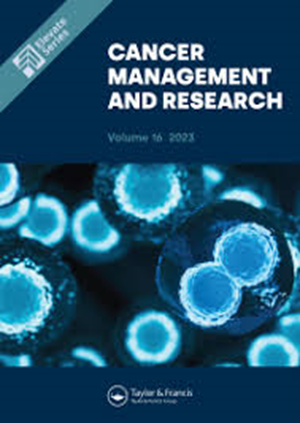Impact of Chemotherapy on Circulating Lymphocyte Subsets in Lung Cancer Patients
IF 2.5
4区 医学
Q3 ONCOLOGY
引用次数: 0
Abstract
Purpose: Lung cancer remains a leading cause of cancer-related death and chemotherapy stands as a fundamental component in therapy. Chemotherapy-induced myelosuppression encompasses a spectrum of hematological declines, including not only neutrophils but also lymphocytes, hemoglobin levels and platelets. This retrospective cohort study investigates alterations in peripheral blood lymphocyte subsets. By uncovering these changes, our goal is to refine patient management strategies, ensuring that the benefits of chemotherapy are maximized while minimizing its detrimental effects.Patients and Methods: We retrospectively analyzed 159 lung cancer patients. Patients were categorized as “NT” (n=108, no previous anti-tumor therapy), and “PT” (n=51, prior therapy followed by at least a two-month treatment-free interval). Post-chemotherapy, patients were reassessed and grouped into “EarlyCycle” for those who underwent four or fewer cycles, and “LateCycle” for those who underwent more than four cycles.
Results: The study focused on analyzing the percentages of lymphocyte subsets, including T cells (CD4+, CD8+), B cells, and natural killer (NK) cells, across these groups. For T cells, the EarlyCycle group exhibited a significant increase compared to NT (0.7783 vs 0.7271; p=0.0017) and PT (0.7783 vs 0.6804; p=1.6e-05). B cells showed a significant decrease from NT to LateCycle (0.1014 vs 0.0817; p=2.2e-05) and from PT to LateCycle (0.1317 vs 0.0817; p=6.2e-10). NK cells significantly decreased in the EarlyCycle group compared to NT (0.1109 vs 0.1462; p=0.00816) and PT (0.1109 vs 0.1513; p=0.00992), with no significant change in the LateCycle group compared to either NT or PT (p> 0.05).
Conclusion: Chemotherapy significantly affects lymphocyte subsets in a treatment-specific manner. The EarlyCycle group experienced a reduction in NK cell and an increase in T cell, suggesting a damage of innate immunity and an early shift towards adaptive immunity. The LateCycle group showed a substantial decrease in B cell, indicating a delayed effect on humoral immunity components.
Keywords: chemotherapy, lung cancer, myelosuppression, peripheral blood, lymphocyte subsets
化疗对肺癌患者循环淋巴细胞亚群的影响
目的:肺癌仍然是癌症相关死亡的主要原因,而化疗是治疗的基本组成部分。化疗引起的骨髓抑制包括一系列血液学指标的下降,不仅包括中性粒细胞,还包括淋巴细胞、血红蛋白水平和血小板。这项回顾性队列研究调查了外周血淋巴细胞亚群的变化。通过揭示这些变化,我们的目标是完善患者管理策略,确保最大限度地发挥化疗的益处,同时最大限度地减少化疗的不利影响:我们对 159 名肺癌患者进行了回顾性分析。患者被分为 "NT"(人数=108,既往未接受过抗肿瘤治疗)和 "PT"(人数=51,既往接受过治疗后至少有两个月的无治疗间隔期)两类。化疗后,对患者进行重新评估,并将接受四个或四个以下周期治疗的患者分为 "早期周期 "和 "晚期周期":研究重点是分析各组淋巴细胞亚群的百分比,包括 T 细胞(CD4+、CD8+)、B 细胞和自然杀伤细胞(NK)。就 T 细胞而言,EarlyCycle 组比 NT 组(0.7783 vs 0.7271; p=0.0017)和 PT 组(0.7783 vs 0.6804; p=1.6e-05)显著增加。B细胞从NT到LateCycle(0.1014 vs 0.0817;p=2.2e-05)和从PT到LateCycle(0.1317 vs 0.0817;p=6.2e-10)均有显著下降。与NT(0.1109 vs 0.1462; p=0.00816)和PT(0.1109 vs 0.1513; p=0.00992)相比,早周期组的NK细胞明显减少,晚周期组与NT或PT相比无明显变化(p> 0.05):结论:化疗对淋巴细胞亚群的影响具有治疗特异性。早周期组 NK 细胞减少,T 细胞增加,表明先天性免疫受到破坏,适应性免疫早期转移。晚周期组 B 细胞大幅减少,表明对体液免疫成分的影响延迟。
本文章由计算机程序翻译,如有差异,请以英文原文为准。
求助全文
约1分钟内获得全文
求助全文
来源期刊

Cancer Management and Research
Medicine-Oncology
CiteScore
7.40
自引率
0.00%
发文量
448
审稿时长
16 weeks
期刊介绍:
Cancer Management and Research is an international, peer reviewed, open access journal focusing on cancer research and the optimal use of preventative and integrated treatment interventions to achieve improved outcomes, enhanced survival, and quality of life for cancer patients. Specific topics covered in the journal include:
◦Epidemiology, detection and screening
◦Cellular research and biomarkers
◦Identification of biotargets and agents with novel mechanisms of action
◦Optimal clinical use of existing anticancer agents, including combination therapies
◦Radiation and surgery
◦Palliative care
◦Patient adherence, quality of life, satisfaction
The journal welcomes submitted papers covering original research, basic science, clinical & epidemiological studies, reviews & evaluations, guidelines, expert opinion and commentary, and case series that shed novel insights on a disease or disease subtype.
 求助内容:
求助内容: 应助结果提醒方式:
应助结果提醒方式:


